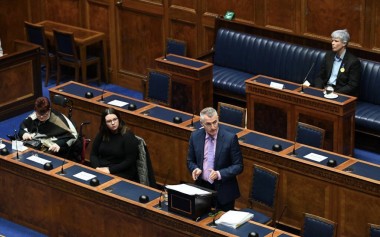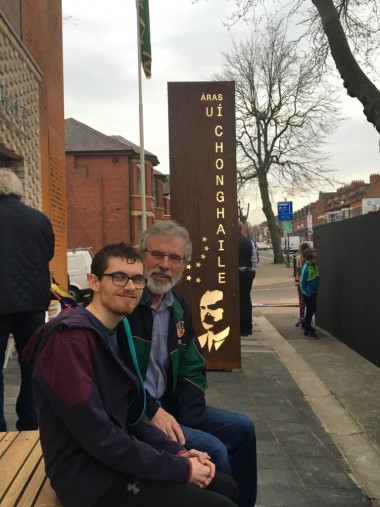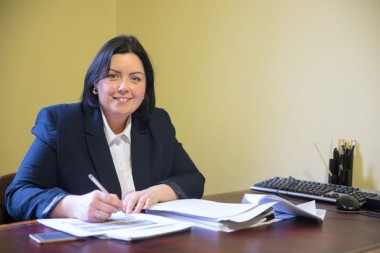7 January 2022
Why Disability Rights are Human Rights – Declan Kearney
"Disability rights are human rights. There should be no legal or financial impediment to securing these standards"
A few weeks ago the Stormont Assembly chamber hosted the inaugural Disabled People’s Parliament which was timed to coincide with the ‘International Day of People with Disabilities’.
This first ever sitting debated a motion on the United Nations Convention on the Rights of Persons with Disabilities (UNCRPD), and ‘That this Parliament calls on the First Minister and Deputy First Minister to commit to fully incorporating the United Nations Convention on the Rights of Persons with Disabilities into legislation in the north of Ireland’

Fourteen speakers presented their perspectives and experiences as both activists and people with disabilities, on why a change to the law based on the UNCPRD is essential to secure proper legal supports, rights, and equality for themselves, and all disabled people in the north.
I had the personal privilege of responding as an Executive Minister on behalf of The Executive Office.
In my opening comments I acknowledged the respect and dignity which an Ceann Comhairle (Speaker) Alex Maskey had shown those in our community with disabilities by facilitating and presiding over this Parliament, and the great effort from the Disability Rights Sector in helping to make the event happen.
All of those who addressed the Parliament did so with immense conviction, courage and humanity. It was a very challenging and inspirational occasion.
I described it as probably one of the most important debates to ever take place in the Assembly chamber.
As we know only too well here, rights delayed are rights denied.
During the debate Amanda Paul told how she suddenly became physically disabled as a married adult and was confronted with a world of previously unknown challenges.
Christina McClements joined the chamber virtually with her daughter Lilia, who has a rare genetic disorder which causes severe physical and learning difficulties. She passionately asserted that Lilia is equal to any other child, but faces exclusion every day of her life.
Dermot Devlin and Michaela Holyrood clearly explained that employment rights for people with disabilities and legislation for UNCPRD were needed just to create a level playing field.
Both Michael Johnston and Joe Kenny described managing their respective lives and vocations with hearing and sight loss.
The impact of Multiple Sclerosis, stress, and panic attacks were outlined by Greta Gurklyte in her life. She stated that the right of access to health care should not be about luck or coincidence.
The need for reliable, disability accessible public transport, investment in community care, and respect for people with learning disabilities was clearly explained by Alison Lockhart, Ronnie Patterson and Jackie Robins.
Both Diane Marks and Rosie Dempsey addressed the challenges faced by adults, and children in school who live with complete or partial loss of sight.
Everyone who spoke in the debate highlighted the multiple institutional and invisible barriers faced by people with disabilities regarding access to all public services, the lived environment, as well as inclusion and participation in public life in the north of Ireland.
What’s clear is that our society remains largely passive, blind and deaf to the huge challenges facing disabled people.
All of the contributions made resonated strongly with me.

My son Fiachra is now 21-years-old and is autistic. He has additional learning disabilities to manage, along with memory loss and regular episodes of severe anxiety.
He is also a very bright, clever young man and has a valuable contribution to offer in making our society a better place.
But Fiachra’s life is challenging and complicated. Very few see or understand his lived realities.
For years Fiachra, his mammy, and I have been navigating the challenge of securing his right to appropriate, long term support and care, and a safe, secure, independent future.
Our experience has not been good. We have been pushed from pillar to post within the social care system. It seems that even the very system is oblivious to the needs of vulnerable young adults.
One in five people here live with a disability. So it’s essential that we give voice to, and support the rights of our family, friends and neighbours with disabilities.
Legislation and public policy must be future-proofed to reflect the needs of people with disabilities.
Tony O’Reilly and Joanne Samsome were emphatic about the rights-based nature of the transformation required to guarantee, and protect the rights, dignity and humanity of disabled persons as equal citizens.
It is obvious that incorporation of the UNCPRD into legislation is key to achieving that objective.
The theme of this year’s International Day celebration was ‘Fighting for Rights in the Post-Covid Era’.
Following the struggles which the pandemic has created for everyone, this theme could not have been more appropriate.
Over the last two years, the global Covid-19 pandemic has widened levels of inequality in our society.
This is especially true for people living with disabilities, who have already been living with institutionalised inequalities and discrimination.
Through our shared family and personal experiences we have watched the level of inequality deepen with respect to accessing public services, including education, healthcare, and many other aspects of daily life.
Disability inclusion must be integral to a truly rights based society.
The barriers which block full participation for disabled people in public life need to be dismantled.
The Disabled People’s Parliament has the potential to become a powerful platform which promotes an unambiguous message, that our society is committed to becoming a ‘no-go area’ for disability discrimination, exclusion or marginalisation.
Our power-sharing Executive has a responsibility to uphold the rights of all citizens in the north of Ireland.
It needs to become fully engaged with the conversation about incorporating the United Nations Convention on the Rights of Persons with Disabilities into law in this region.
Already the Department for Communities, headed up by Sinn Féin Minister Deirdre Hargey, is leading on work to develop, by a process of co-design, a new Executive Disability Strategy as part of a suite of social inclusion strategies detailed in ‘New Decade New Approach’ commitments.

The Disability Strategy Expert Advisory Panel has recommended that consideration is now given to how the UNCRPD could best be given legal effect.
The panel has recommended that a legal scoping study be commissioned to identify and compare the benefits of, and models for, incorporation of the Convention into legislation in the north.
Members of the Disability Strategy Co-design Group have since called for full incorporation of the UNCRPD into local law.
These are very positive developments.
The disability rights framework in the north must reflect international standards.
It has to match the needs and expectations of our citizens with disabilities. That cannot be achieved without their full, democratic participation.
Disability rights are human rights. There should be no legal or financial impediment to securing these standards.
The moral litmus test for all modern societies should be the extent to which they look after, and act to guarantee the rights and welfare of the most vulnerable and most marginalised.
The durability of a truly rights based society should be built on the foundations of rights focused institutions which continuously hold to account, advocate for, and lobby to achieve new progressive standards. This should be the ongoing role of the Disabled People’s Parliament.
We should all share a political and civic responsibility to ensure that this first landmark sitting of the Parliament heralds a new era in which disabled people are included and celebrated as equals in Irish society.
Follow us on Facebook
An Phoblacht on Twitter
Uncomfortable Conversations

An initiative for dialogue
for reconciliation
— — — — — — —
Contributions from key figures in the churches, academia and wider civic society as well as senior republican figures





